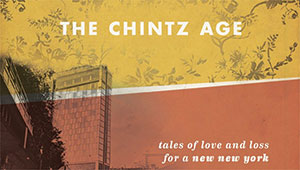
I was just having breakfast with an artist acquaintance at the Bloc 11 Cafe in Somerville, Mass, when the subject turned to where we would move to if we were forced out of our city. We thought of isolated burgs like North Adams, an old mill in Lawrence, far flung nowherevilles in the western part of the state. But of course none of these places are like our hometown of Somerville, where both of us have lived for many years. Across the country artists, low-income folks, and others are being forced out of their communities due to the hungry tendrils of gentrification.

In The Chintz Age… (published by Somerville’s Cervena Barva Press), this short story collection gets deep into the heads of punks, beatniks, hipsters, junkies, derelicts, artists and others as they hold on to the threads of their community with its bodegas, bookstores and all night cafeterias that once heavily peppered the streets of New York City. The author, Ed Hamilton, knows of what he writes. Hamilton, the author of Legends of the Chelsea Hotel, is still a resident of the Chelsea, known by many as the last bastion for bohemians. It is now gutted and a shell of its former self – as it waits to be turned into a boutique hotel.
Hamilton doesn’t abandon his characters and let them vanish into the ether. They reinvent themselves. They take their careworn carcasses and prop themselves up. Hamilton, in his title story The Chintz Age, writes about a middle-aged East Village photographer being forced from her long time apartment. She is long past the beauty and promise of her youth, but she is able to rekindle friendship and more with a figure from her past – a minor league comic book artist now gone to seed. Here, with a tender yet brutal honesty, Hamilton describes their tryst:
“The battle-scarred warriors looked at each other for a long, silent moment. Then they drew themselves together – all the years dropping away as the barrier between them dissolved. They fumbled like two teenagers, kissing and struggling out of their clothes in a car because there was nowhere else, embarrassed by their middle-aged bodies, their lumps and cellulite, their wrinkles and scars and age spots and sagging skin. It had been a long time for both of them and neither was young any longer, though they felt reborn in those brief few minutes, the lingering sin of betrayed idealism washed away in the surge of quickening blood through their freshly supple limbs, and rapidly-firing brains … When they grasped each other they reached through time to grasp, as well, the final shreds of their forgotten selves.”
In his short piece Fat Hippie Books, a long-time East Village used bookstore owner, an unapologetic acolyte of all things Kerouac and the Beats, is being forced out from his hole-in-the-wall bookstore. He manages to find a smaller space and some peace of mind albeit with compromises:
“His life underground would represent a winnowing, a stripping down, a belt-tightening as he reduced his desires to match his straightened circumstances … He would not need to make as much money … He would lead a smaller, more compact life, subsisting on bare necessities and nourished by the strength of his soul, waiting for the cycle to come back around, enduring middle-age, old age, even death if need be – waiting to take his place in a better world that was ready at long last to listen to him when he emerged lean, and wiry, a Holy Barbarian, a wild-haired prophet of Beatitude, from the solitude of his urban grotto.”
And Hamilton is a keen observer. A master of the telling detail. Here he puts a microscope to the archetypal New York City dive bar; a place where a long gone-to seed failed writer takes refuge in:
“Past the thin corridor that contained the bar, its row of stools, and not much else, the room opened up sufficiently to hold a pool table, a row of booths along the wall, and a scattering of wood tables and chairs. The back part of the space was dimly lit by a beer light over the pool table and by tiny red lamps on the wall above the booths. There used to be a steam table along the wall of this Ninth Avenue dive, but that was long gone. Instead, on a card table beside the bar sat three warming urns. Taking a plate from the stack, Theo lifted the three lids in turn: chicken wings in a reeking garlic sauce, disgusting-looking stuffed mushroom caps (shriveled, probably poisonous), and frozen pizza squares with crisp little pepperonis on top.”
Hamilton has an uncanny ability to show how the inroads of time, age, etc., forces choices in our lives. His characters find some sort of redemption, and keep on keepin’ on.
Highly recommended.















Reader Comments